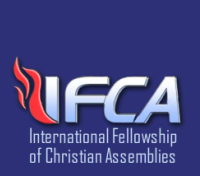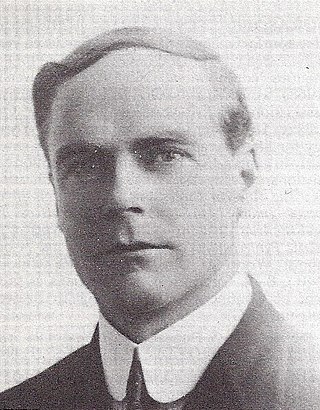Related Research Articles
Pentecostalism or classical Pentecostalism is a Protestant Charismatic Christian movement that emphasizes direct personal experience of God through baptism with the Holy Spirit. The term Pentecostal is derived from Pentecost, an event that commemorates the descent of the Holy Spirit upon the Apostles and other followers of Jesus Christ while they were in Jerusalem celebrating the Feast of Weeks, as described in the Acts of the Apostles.

The World Assemblies of God (AG), officially the World Assemblies of God Fellowship (WAGF) is a global cooperative body of over 140 Assemblies of God national fellowships, established on August 15, 1989. WAGF was created to provide structure so that member denominations, which previously related to each other informally, could more easily cooperate on a global basis.

The International Fellowship of Christian Assemblies (IFCA), formerly known as the Christian Church of North America (CCNA), is a North American Pentecostal denomination with roots in the Italian-American community, but is now a multicultural denomination. Central offices are located in Transfer, Pennsylvania. Ministries of the church include Benevolence, Home Missions, FOCUS, Foreign Missions, Education, Lay Ministries, and Public Relations. A convention is held annually, and their official publication is Vista, a quarterly magazine. Membership in 2000 was about 7,200 in 96 churches in the United States. They also have thousands of affiliated congregations internationally in Africa, Australia, Canada, Europe, South America, and Asia with a strong presence in India with over 100,000 members in over 1,000 churches. Brother Rick George is the general overseer of the denomination.
The charismatic movement in Christianity is a movement within established or mainstream Christian denominations to adopt beliefs and practices of Charismatic Christianity, with an emphasis on baptism with the Holy Spirit, and the use of spiritual gifts (charismata). It has affected most denominations in the United States, and has spread widely across the world.
The Latter Rain, also known as the New Order or the New Order of the Latter Rain, was a post-World War II movement within Pentecostal Christianity which remains controversial. The movement saw itself as a continuation of the restorationism of early Pentecostalism. The movement began with major revivals between 1948 and 1952 and became established as a large semi-organized movement by 1952. It continued into the 1960s. The movement had a profound impact on subsequent movements as its participants dispersed throughout the broader charismatic and Pentecostal movements beginning in the 1960s.

The Alliance World Fellowship is an evangelical Christian denomination It includes 6.2 million members throughout 88 countries within 22,000 churches.

The Pentecostal Assemblies of Canada (PAOC) is a Finished Work Pentecostal denomination of Christianity and the largest evangelical church in Canada. Its headquarters is located in Mississauga, Ontario. The PAOC is theologically evangelical and Pentecostal, emphasizing the baptism with the Holy Spirit with the evidence of speaking in tongues. It historically has had strong connections with the Assemblies of God in the United States. It is affiliated with the Evangelical Fellowship of Canada and the World Assemblies of God Fellowship.
The Neo-charismaticmovement is a movement within evangelical Protestant Christianity that is composed of a diverse range of independent churches and organizations that emphasize the current availability of gifts of the Holy Spirit, such as speaking in tongues and faith healing. The Neo-charismatic movement is considered to be the "third wave" of the Charismatic Christian tradition which began with Pentecostalism, and was furthered by the Charismatic movement. As a result of the growth of postdenominational and independent charismatic groups, Neo-charismatics are now believed to be more numerous than the first and second wave categories. As of 2002, some 19,000 denominations or groups, with approximately 295 million individual adherents, were identified as Neo-charismatic.

Louis Francescon was a missionary and pioneer of the Italian Pentecostal Movement. Several Pentecostal denominations and fellowships acknowledge him as their founder, including the Christian Church of North America, the Christian Assembly in Argentina, the Assemblies of God in Italy, the Christian Congregation in the United States, and the Christian Congregation of Brazil.
The Australian Christian Churches (ACC), formerly Assemblies of God in Australia, is a network of Finished Work Pentecostal churches in Australia affiliated with the World Assemblies of God Fellowship, which is the largest Pentecostal denomination in the world.

The Assemblies of God USA (AG), officially The General Council of the Assemblies of God, is a Pentecostal Christian denomination in the United States and the U.S. branch of the World Assemblies of God Fellowship, the world's largest Pentecostal body. The AG reported 2.9 million adherents in 2022. In 2011, it was the ninth largest Christian denomination and the second largest Pentecostal denomination in the United States. The Assemblies of God is a Finished Work denomination, and it holds to a conservative, evangelical and classical Arminian theology as expressed in the Statement of Fundamental Truths and position papers, which emphasize such core Pentecostal doctrines as the baptism in the Holy Spirit, speaking in tongues, divine healing and the Second Coming of Jesus Christ.
Finished Work Pentecostalism is a major branch of Pentecostalism that holds that after conversion, the converted Christian progressively grows in grace. On the other hand, the other branch of Pentecostalism—Holiness Pentecostalism teaches the Wesleyan doctrine of entire sanctification as an instantaneous, definite second work of grace, which is a necessary prerequisite to receive the baptism in the Holy Spirit. Finished Work Pentecostals are generally known to have retained the doctrine of progressive sanctification from their earlier Reformed roots, while Holiness Pentecostals retained their doctrine of entire sanctification from their earlier Wesleyan roots. William Howard Durham is considered to be the founder of Finished Work Pentecostalism.

William Howard Durham was an early Pentecostal preacher and theologian, best known for advocating the Finished Work doctrine.
Pentecostalism is a renewal movement within Protestant Christianity that places special emphasis on a direct personal relationship with God and experience of God through the baptism with the Holy Spirit. For Christians, this event commemorates the descent of the Holy Spirit upon the followers of Jesus Christ, as described in the second chapter of the Book of Acts. Pentecostalism was established in Kerala, India at the start of the 20th century.

The Swedish Pentecostal Movement is a Pentecostal movement in Sweden. Many, but not all, of these, are members of the Pentecostal Alliance of Independent Churches, which was founded in 2001. The Pentecostal movement spread to Sweden by 1907 from the 1904–1905 Welsh Revival and the Azusa Street Revival in Los Angeles in 1906.

Pentecostalism in Australia is a large and growing Christian movement. Pentecostalism is a renewal movement within Protestant Christianity that places special emphasis on a direct personal experience of God through baptism with the Holy Spirit. It emerged from 19th century precursors between 1870 and 1910, taking denominational form from c. 1927. From the early 1930s, Pentecostal denominations multiplied, and there are now several dozen, the largest of which relate to one another through conferences and organisations such as the Australian Pentecostal Ministers Fellowship. The Australian Christian Churches, formerly known as the Australian Assemblies of God, is the oldest and longest lasting Pentecostal organisation in Australia. The AOG/ACC is also the largest Pentecostal organisation in Australia with over 300,000 members in 2018. Until 2018, Hillsong Church was one of 10 megachurches in Australia associated with the ACC that have at least 2,000 members weekly. According to the church, over 100,000 people attend services each week at the church or one of its 80 affiliated churches located worldwide.
Pentecostalism in Ethiopia is the practice of various Pentecostal forms of Christianity—often included within the evangelical category of P'ent'ay—in Ethiopia, with a constituency of above 1 million members. Despite persecution by the government and the dominant Ethiopian Orthodox Church, Pentecostalism relied on youth and technology to spread its practices throughout the country. It has been found to contribute to the prosperity of people in Ethiopia. The message of Pentecostalism includes prosperity and beliefs around expectations for a better life. After gaining religious freedom in 1991, churches began preaching prosperity and growth outside the government and to discuss fighting corruption. Some Pentecostal worshipers state that the style of worship offers them tangible help for worldy problems. Worship services include the practices speaking in tongues, divine healing, exorcism, prophecy, and powerful prayer.
Pentecostalism began spreading in South Africa after William J. Seymour, of the Azusa Street mission, sent missionaries to convert and organize missions. By the 1990s, approximately 10% of the population of South Africa was Pentecostal. The largest denominations were the Apostolic Faith Mission, Assemblies of God, and the Full Gospel Church of God. Another 30% of the population was made up of mostly black Zionist and Apostolic churches, which comprise a majority of South Africa's African Instituted Churches(AICs). In a 2006 survey, 1 in 10 urban South Africans said they were Pentecostal, and 2 in 10 said they were charismatic. In total, renewalists comprised one-fourth of the South African urban population. A third of all protestants surveyed said that they were Pentecostal or charismatic, and one-third of all South African AIC members said they were charismatic.
Charismatic Christianity is a form of Christianity that emphasizes the work of the Holy Spirit and spiritual gifts as an everyday part of a believer's life. It has a global presence in the Christian community. Practitioners are often called charismatic Christians or renewalists. Although there is considerable overlap, charismatic Christianity is often categorized into three separate groups: Pentecostalism, the Charismatic movement, and the neo-charismatic movement.
References
- Pluess, Jean-Daniel (2015), "One in the Spirit? Pentecostals and the Yearning for Christian Unity: A Case Study of the Swiss Pentecostal Mission and Its Initiatives Towards Unity in the Spirit", in Gibaut, John; Jorgensen, Knud (eds.), Called to Unity: For the Sake of Mission, Wipf and Stock Publishers, pp. 173–185, ISBN 978-1498223027 .
- Schmid, Georg (2006). "Schweizerische Pfingstmission" . Retrieved May 29, 2017.
- Schmidgall, Paul (2013). European Pentecostalism: Its Origins, Development, and Future. CPT Press. ISBN 978-1935931195.
- Simpson, Carl (2011), "The Development of the Pentecostal and Charismatic Movements in the Germanic Countries", in Kay, William K.; Dyer, Anne E. (eds.), European Pentecostalism, Brill, ISBN 978-9004207301